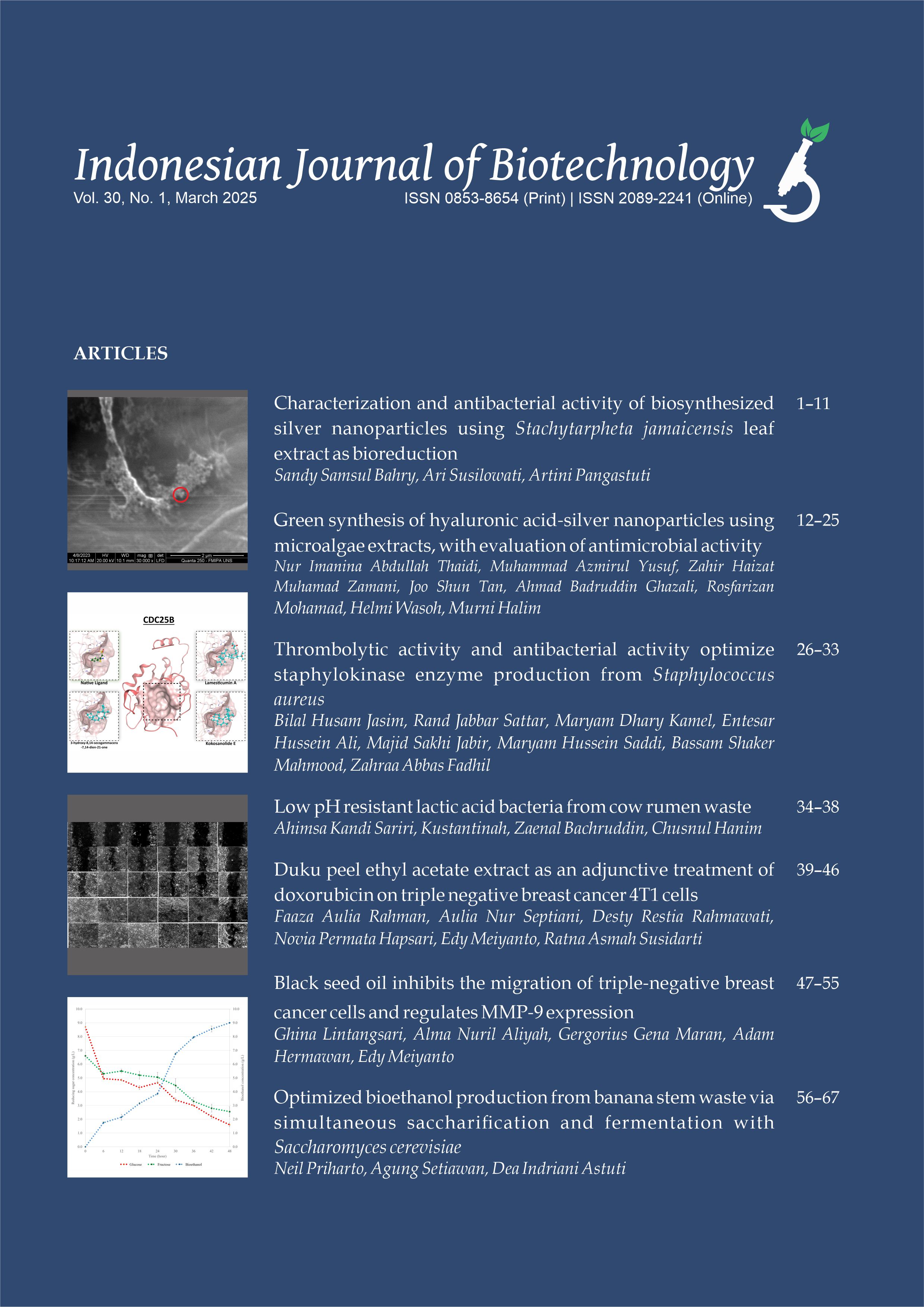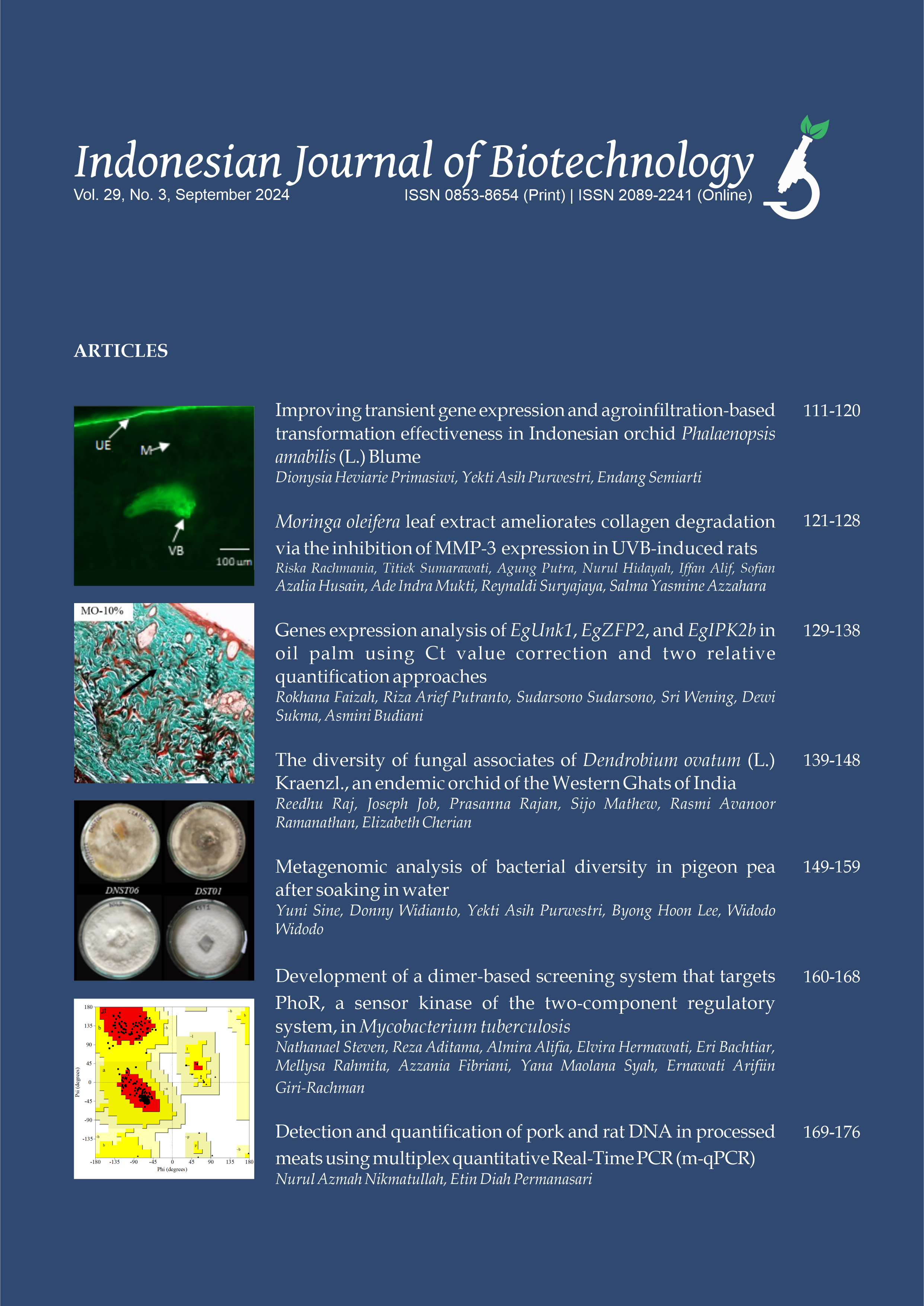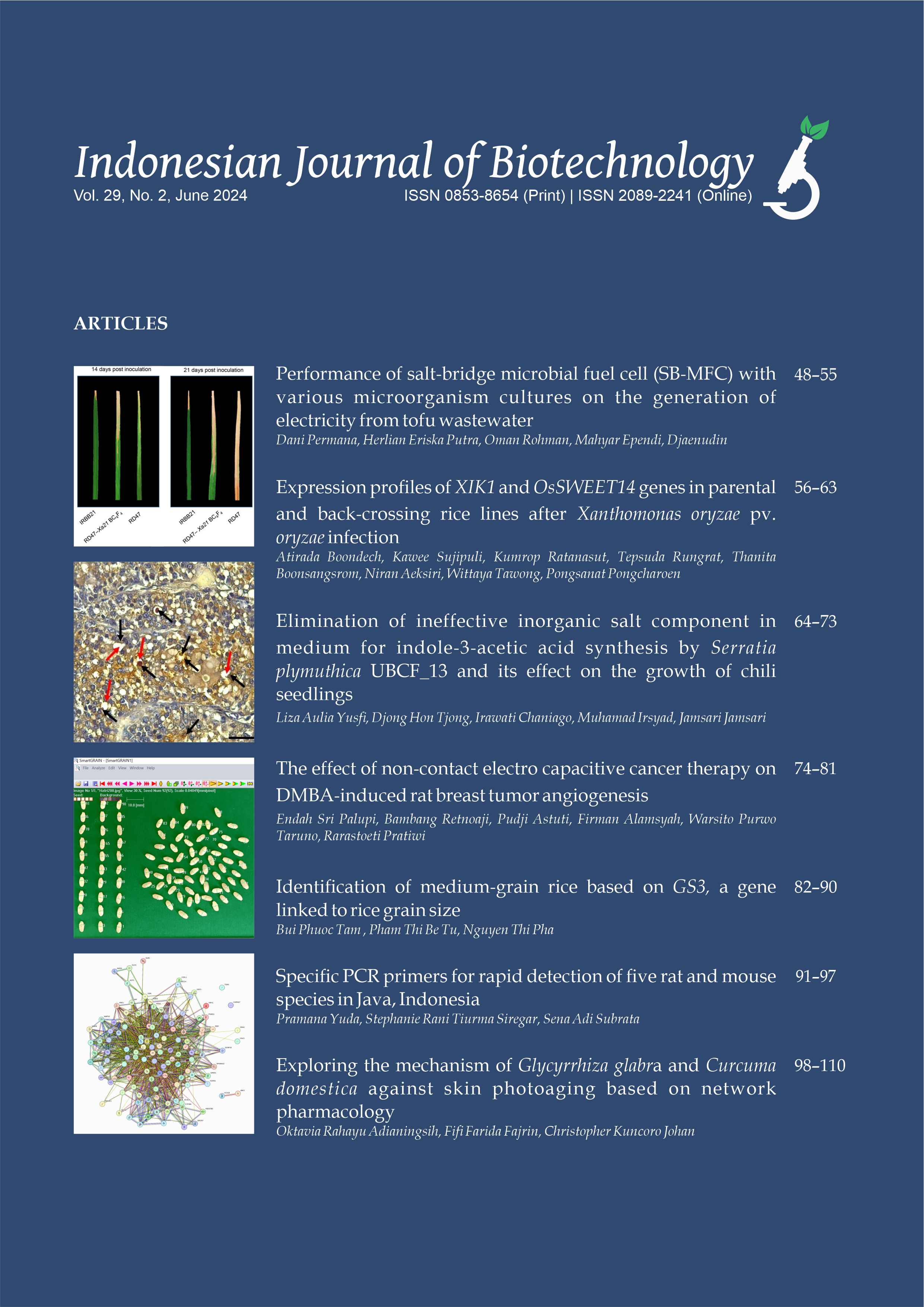Cloning and in silico study of an endoglucanase from a thermophilic bacterium isolated from a hydrothermal vent of West Kawio, Sangihe‐Talaud waters, North Sulawesi, Indonesia
Edvan Arifsaputra Suherman(1*), Maelita Ramdani Moeis(2), Elvi Restiawaty(3)
(1) School of Life Sciences and Technology, Institut Teknologi Bandung, Jalan Ganesha 10, Bandung 40132, Indonesia
(2) School of Life Sciences and Technology, Institut Teknologi Bandung, Jalan Ganesha 10, Bandung 40132, Indonesia
(3) Department of Chemical Engineering, Institut Teknologi Bandung, Jalan Ganesha 10, Bandung 40132, Indonesia
(*) Corresponding Author
Abstract
Pro, and lower percentage of Gly compared to thermolabile endoglucanases from two Bacillus species. EgDSI2 harbored a catalytc domain belonging to glycosyl hydrolase family 9 (GH9) and a type 3 cellulose‐binding domain (CBM3). Propertes of endoglucanases with GH9‐CBM3 modular organizaton include actvity over a wide pH range, high optmum temperature, and thermostablity. Therefore, EgDSI2 has potental applicatons in the industries.
Keywords
Full Text:
PDFReferences
Altschul SF, Gish W, Miller W, Myers EW, Lipman DJ. 1990. Basic local alignment search tool. J Mol Biol 215(3):403–410. doi:10.1016/S0022 2836(05)803602.
Bajaj K, Madhusudhan MS, Adkar BV, Chakrabarti P, Ra makrishnan C, Sali A, Varadarajan R. 2007. Stereo chemical criteria for prediction of the effects of pro line mutations on protein stability. PLoS Comput Biol 3(12):e241. doi:10.1371/journal.pcbi.0030241.
Dalhus B, Saarinen M, Sauer UH, Eklund P, Johans son K, Karlsson A, Ramaswamy S, Bjørk A, Syn stad B, Naterstad K, et al. 2002. Structural ba sis for thermophilic protein stability: structures of thermophilic and mesophilic malate dehydrogenases. J Mol Biol 318(3):707–721. doi:10.1016/S0022 2836(02)000505.
De Castro E, Sigrist CJA, Gattiker A, Bulliard V, LangendijkGenevaux PS, Gasteiger E, Bairoch A, Hulo N. 2006. ScanProsite: detection of PROSITE signature matches and ProRuleassociated functional and structural residues in proteins. Nucleic Acids Res 34(suppl_2):W362–W365. doi:10.1093/nar/gkl124.
De Marco EG, Heck K, Martos ET, Van Der Sand ST. 2017. Purification and characterization of a thermostable alkaline cellulase produced by Bacillus licheniformis 380 isolated from compost. An Acad Bras Cienc 89(3):2359–2370. doi:10.1590/0001 3765201720170408.
Dos Santos YQ, De Veras BO, De Franca AFJ, Gorlach Lira K, Velasques J, Migliolo L, Dos Santos EA. 2018. A new salttolerant thermostable cellulase from a marine Bacillus sp. strain. J Microbiol Biotechnol 28(7):1078–1085. doi:10.4014/jmb.1802.02037.
Ebrahimi M, Lakizadeh A, AghaGolzadeh P, Ebrahimie E, Ebrahimi M. 2011. Prediction of thermosta bility from amino acid attributes by combination of clustering with attribute weighting: a new vista in engineering enzymes. PloS ONE 6(8):e23146. doi:10.1371/journal.pone.0023146.
Gasteiger E, Hoogland C, Gattiker A, Wilkins MR, Appel RD, Bairoch A. 2005. Protein identification and anal ysis tools on the ExPASy server. In: WJ M, editor, The Proteomics Protocols Handbook, pages 571–607. Totowa: Humana Press.
Grosjean H, Oshima T. 2007. How Nucleic Acids Cope with High Temperature. In: C Ger day, N Glansdorff, editors, Physiol Biochem Ex tremophiles., pages 39–56. Washington DC: ASM Press. doi:10.1128/9781555815813.ch4.
Gupta A, Verma JP. 2015. Sustainable bioethanol production from agroresidues: a review. Re newable Sustainable Energy Rev 41:550–567. doi:10.1016/j.rser.2014.08.032.
Hall TA. 1999. BioEdit: a userfriendly biological se quence alignment editor and analysis program for Windows 95/98/NT. In: Nucl Acids Symp Series., volume 41, pages 95–98. [London]: Information Re trieval Ltd., c1979c2000.
Henrissat B, Callebaut I, Fabrega S, Lehn P, Mornon JP, Davies G. 1995. Conserved catalytic machin ery and the prediction of a common fold for several families of glycosyl hydrolases. Proc Natl Acad Sci 92(15):7090–7094. doi:10.1073/pnas.92.15.7090.
Hitomi J, Hatada Y, Kawaminami S, Kawai S, Ito S. 1997. Amino acid sequence and stereoselective hydrolytic reaction of an endo1, 4βglucanase from a Bacil lus strain. Biosci, Biotechnol, Biochem 61(12):2004–2009. doi:10.1271/bbb.61.2004.
Hulo N, Bairoch A, Bulliard V, Cerutti L, Cuche BA, De Castro E, Lachaize C, Langendijk Genevaux PS, Sigrist CJA. 2007. The 20 years of PROSITE. Nucl Acids Res 36(suppl_1):D245– D249. doi:10.1093/nar/gkm977.
Ishak SNH, Masomian M, Kamarudin NHA, Ali MSM, Leow TC, Rahman RNZRA. 2019. Changes of thermostability, organic solvent, and pH sta bility in Geobacillus zalihae HT1 and its mutant by calcium ion. Int J Mol Sci 20(10):2561. doi:10.3390/ijms20102561.
Jang HD, Chen KS. 2003. Production and characteri zation of thermostable cellulases from Streptomyces transformant T31. World J Microbiol Biotechnol 19(3):263–268. doi:10.1023/A:1023641806194.
Jeong E, Kim H, Lee SW, Han KS. 2003. Discovering the interaction propensities of amino acids and nu cleotides from proteinRNA complexes. Mol Cells 16(2):161–167.
Jones P, Binns D, Chang HY, Fraser M, Li W, McAnulla C, McWilliam H, Maslen J, Mitchell A, Nuka G, et al. 2014. InterProScan 5: genomescale protein func tion classification. Bioinformatics 30(9):1236–1240. doi:10.1093/bioinformatics/btu031.
Kajander T, Kahn PC, Passila SH, Cohen DC, Lehtiö L, Adolfsen W, Warwicker J, Schell U, Goldman A. 2000. Buried charged surface in proteins. Structure 8(11):1203–1214. doi:10.1016/S0969 2126(00)005207.
Kanchanadumkerng P, Sakka M, Sakka K, Wiwat C. 2017. Characterization and secretive expression in Bacillus subtilis of endoglucanase from Bacillus safensis iso lated from freshwater swamp forest. Walailak J Sci & Tech 14(3):199–213.
Kar T, Scheiner S. 2004. Comparison of cooperativity in CH–O and OH–O hydrogen bonds. J Phys Chem A 108(42):9161–9168. doi:10.1021/jp048546l.
Khianngam S, Pootaengon Y, Techakriengkrai T, Tana supawat S. 2014. Screening and identifica tion of cellulase producing bacteria isolated from oil palm meal. J Appl Pharm Sci 4(4):90. doi:10.7324/JAPS.2014.40416.
Koenig JJ, Neudörfl JM, Hansen A, Breugst M. 2018. Redetermination of the solventfree crys tal structure of lproline. Acta Crystallogr, Sect E: Crystallogr Commun 74(8):1067–1070. doi:10.1107/S2056989018009490.
Kumar S, Arya S, Nussinov R. 2007. Temperature dependent molecular adaptation features in pro teins. In: C Gerday, N Glansdorff, editors, Phys iol Biochem Extremophiles, pages 75–85. Wash ington DC: American Society of Microbiology. doi:10.1128/9781555815813.ch6.
Kumar S, Stecher G, Li M, Knyaz C, Tamura K. 2018. MEGA X: molecular evolutionary genetics analy sis across computing platforms. Mol Biology Evol 35(6):1547–1549. doi:10.1093/molbev/msy096.
Kumwenda B, Litthauer D, Bishop OT, Reva O. 2013. Analysis of protein thermostability enhanc ing factors in industrially important Thermus bac teria species. Evol Bioinf Online 9:EBO–S12539. doi:10.4137/EBO.S12539.
Ladenstein R, Antranikian G. 1998. Proteins from hy perthermophiles: stability and enzymatic catalysis close to the boiling point of water. In: Biotechnol ogy of Extremophiles, pages 37–85. Berlin: Springer. doi:10.1007/BFb0102289.
Lane CE, Hulgan D, O’Quinn K, Benton MG. 2015. CE MAsuite: open source degenerate PCR primer design. Bioinformatics 31(22):3688–3690. doi:10.1093/bioinformatics/btv420.
Larkin MA, Blackshields G, Brown NP, Chenna R, McGettigan PA, McWilliam H, McWilliam H, Valentin F, Wallace IM, Wilm A, Lopez R, et al. 2007. Clustal W and Clustal X ver sion 2.0. Bioinformatics 23(21):2947–2948. doi:10.1093/bioinformatics/btm404.
Lateef A, Adelere IA, GueguimKana EB. 2015. The biology and potential biotechnological applications of Bacillus safensis. Biologia 70(4):411–419. doi:10.1515/biolog20150062.
Li W, Zhang WW, Yang MM, Chen YL. 2008. Cloning of the thermostable cellulase gene from newly iso lated Bacillus subtilis and its expression in Es cherichia coli. Mol Biotechnol 40(2):195–201. doi:10.1007/s120330089079y.
Li YH, Ding M, Wang J, Xu GJ, Zhao F. 2006. A novel thermoacidophilic endoglucanase, BaEGA, from a new cellulosedegrading bacterium, Bacillus sp. AC1. Appl Microbiol Biotechnol 70(4):430–436. doi:10.1007/s002530050075x.
Lima AOS, Quecine MC, Fungaro MHP, Andreote FD, Maccheroni W, Araújo WL, SilvaFilho MC, PizziraniKleiner AA, Azevedo J. 2005. Molecular characterization of a β1, 4endoglucanase from an endophytic Bacillus pumilus strain. Appl Microbiol Biotechnol 68(1):57–65. doi:10.1007/s0025300417401.
Lynd LR, Weimer PJ, Van Zyl WH, Pretorius IS. 2002. Microbial cellulose utilization: fundamentals and biotechnology. Microbiol Mol Biol Rev 66(3):506– 577. doi:10.1128/MMBR.66.3.506577.2002.
Mc Gowan J. 2015. Bioinformatics Tools. URL https://jamiemcg.github.io/bioinf/gc.html.
Milburn D, Laskowski RA, Thornton JM. 1998. Se quences annotated by structure: a tool to fa cilitate the use of structural information in se quence analysis. Protein Eng 11(10):855–859. doi:10.1093/protein/11.10.855.
Moeis MR, Natalia D, Ningrum RW, Dwijayanti A. 2014. Cloning and expression of endoglucanase gene from thermophilic bacteria Bacillus sp. RP1. Microbiology Indonesia 8(4):4. doi:10.5454/mi.8.4.4.
Nakashima H, Fukuchi S, Nishikawa K. 2003. Compo sitional changes in RNA, DNA and proteins for bacterial adaptation to higher and lower temperatures. J Biochem 133(4):507–513. doi:10.1093/jb/mvg067.
Patel K, Patel H, Shah G. 2014. Production and optimiza tion of cellulase enzymes from newly isolated fungi. J Pure Appl Microbiol 8(5):4163–4169.
Ragone R. 2001. Hydrogenbonding classes in proteins and their contribution to the unfolding reaction. Pro tein Sci 10(10):2075–2082. doi:10.1110/ps.09201.
Rice P, Longden I, Bleasby A. 2000. EMBOSS: the European molecular biology open software suite. Trends Genet 16(6):276–277. doi:10.1016/S0168 9525(00)020242.
Sadeghi M, NaderiManesh H, Zarrabi M, Ranjbar B. 2006. Effective factors in thermostability of ther mophilic proteins. Biophys Chem 119(3):256–270. doi:10.1016/j.bpc.2005.09.018.
Satomi M, La Duc M, Venkateswaran K. 2006. Bacil lus safensis sp. nov., isolated from spacecraft and assemblyfacility surfaces. Int J Syst Evol Microbiol 56(8):1735–1740. doi:10.1099/ijs.0.641890.
Sheng P, Huang S, Wang Q, Wang A, Zhang H. 2012. Isolation, screening, and optimization of the fer mentation conditions of highly cellulolytic bacte ria from the hindgut of Holotrichia parallela larvae (Coleoptera: Scarabaeidae). Appl Biochem Biotech nol 167(2):270–284. doi:10.1007/s120100129670
3.
Shimon L, Belaich A, Belaich JP, Bayer E, Lamed R, Shoham Y, Frolow F, et al. 2000. Structure of a family IIIa scaffoldin CBD from the cellulosome of Clostrid ium cellulolyticum at 2.2 Å resolution. Acta Crys tallogr, Sect D: Biol Crystallogr 56(12):1560–1568. doi:10.1107/S0907444900012889.
Sievers F, Wilm A, Dineen D, Gibson T, Karplus K, Li W, Lopez R, McWilliam H, Remmert M, Söding J, Thompson J, Higgins D. 2011. Fast, scalable gener ation of highquality protein multiple sequence align ments using Clustal Omega. Mol Syst Biol 7(1). doi:10.1038/msb.2011.75.
Slepecky R, Hemphill H. 2006. The Genus Bacillus— Nonmedical, pages 530–562. New York: Springer US. doi:10.1007/0387307443_16.
Srinivas R, Panda T. 1998. pH and thermal stability studies of carboxymethyl cellulase from intergeneric fusants of Trichoderma reesei/Saccharomyces cere visiae. J Ind Microbiol Biotechnol 21(45):178–183. doi:10.1038/sj.jim.2900556.
Sukumaran R, Singhania RR, Pandey A. 2005. Microbial cellulasesproduction, applications and challenges. J Sci Ind Res 64:832–844.
Teather R, Wood P. 1982. Use of Congo red polysaccharide interactions in enumeration and char acterization of cellulolytic bacteria from the bovine rumen. Appl Environ Microbiol 43(4):777–780.
Tormo J, Lamed R, Chirino A, Morag E, Bayer E, Shoham Y, Steitz T. 1996. Crystal structure of a bacterial familyIII cellulosebinding domain: a general mechanism for attachment to cellulose. EMBO J 15(21):5739–5751. doi:10.1002/j.1460 2075.1996.tb00960.x.
Turner P, Mamo G, Karlsson E. 2007. Potential and utilization of thermophiles and thermostable en zymes in biorefining. Microb Cell Fact 6(1):9. doi:10.1186/1475285969.
Van den Burg B, Vriend G, Veltman OR, Venema G, Ei jsink VGH. 1998. Engineering an enzyme to re sist boiling. Proc Natl Acad Sci 95(5):2056–2060. doi:10.1073/pnas.95.5.2056.
Veltman OR, Vriend G, Middelhoven PJ, van den Burg B, Venema G, Eijsink VGH. 1996. Analysis of struc tural determinants of the stability of thermolysinlike proteases by molecular modelling and sitedirected mutagenesis. Protein Eng, Des Sel 9(12):1181–1189. doi:10.1093/protein/9.12.1181.
Watanabe K, Chishiro K, Kitamura K, Suzuki Y. 1991. Proline residues responsible for thermostability oc cur with high frequency in the loop regions of an extremely thermostable oligo1, 6glucosidase from Bacillus thermoglucosidasius KP1006. J Biol Chem 266(36):24287–24294.
Waterhouse A, Bertoni M, Bienert S, Studer G, Tauriello G, Gumienny R, Heer FT, de Beer TAP, Rempfer C, Bordoli L, et al. 2018. SWISSMODEL: ho mology modelling of protein structures and com plexes. Nucl Acids Res 46(W1):W296–W303. doi:10.1093/nar/gky427.
Wood TM, Bhat KM. 1988. Biomass, Part A: Cellulose and hemicellulose. In: WA Wood, ST Kellog, editors, Methods in Enzymology, volume 160, pages 87–91. New York: Academic Press.
Yachdav G, Kloppmann E, Kajan L, Hecht M, Goldberg T, Hamp T, Hönigschmid P, Schafferhans A, Roos M, Bernhofer M, et al. 2014. PredictProtein—an open resource for online prediction of protein structural and functional features. Nucl Acids Res 42(W1):W337– W343. doi:10.1093/nar/gku366.
Yan BX, Sun YQ. 1997. Glycine residues provide flexibil ity for enzyme active sites. J Biol Chem 272(6):3190– 3194. doi:10.1074/jbc.272.6.3190.
Yang D, Weng H, Wang M, Xu W, Li Y, Yang H. 2010. Cloning and expression of a novel thermostable cel lulase from newly isolated Bacillus subtilis strain I15. Mol Biol Rep 37(4):1923–1929. doi:10.1007/s11033 0099635y.
Ye J, Coulouris G, Zaretskaya I, Cutcutache I, Rozen S, Madden TL. 2012. PrimerBLAST: a tool to design targetspecific primers for polymerase chain reaction. BMC Bioinf 13(1):134. doi:10.1186/1471210513 134.
Yu H, Zhao Y, Guo C, Gan Y, Huang H. 2015. The role of proline substitutions within flexible re gions on thermostability of luciferase. Biochim Biophys Acta, Proteins Proteomics 1854(1):65–72. doi:10.1016/j.bbapap.2014.10.017.
Zarafeta D, Kissas D, Sayer C, Gudbergsdottir SR, Ladoukakis E, Isupov MN, Chatziioannou A, Peng X, Littlechild JA, Skretas G, et al. 2016. Dis covery and characterization of a thermostable and highly halotolerant GH5 cellulase from an icelandic hot spring isolate. PLoS One 11(1):e0146454. doi:10.1371/journal.pone.0146454.
Zhang YHP, Himmel ME, Mielenz JR. 2006. Out look for cellulase improvement: screening and se lection strategies. Biotechnol Adv 24(5):452–481. doi:10.1016/j.biotechadv.2006.03.003.
Article Metrics
Refbacks
- There are currently no refbacks.
Copyright (c) 2020 The Author(s)

This work is licensed under a Creative Commons Attribution-ShareAlike 4.0 International License.









